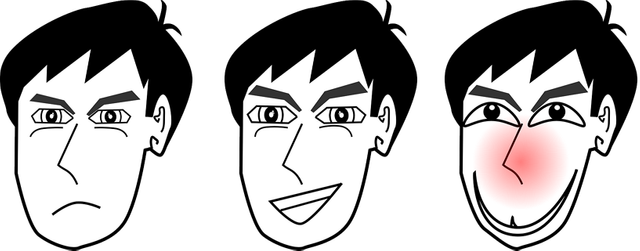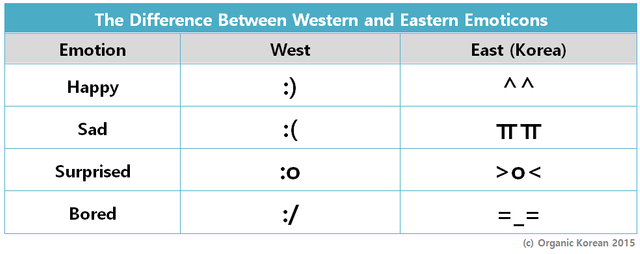Asian Facial Expressions and Emojis ‘not universal’

A new study from Glasgow University shows that people from different cultures read facial expressions differently. East Asian participants in the study focused mostly on the eyes, while those from the West scanned the whole face. Asians found it more difficult to distinguish some facial expressions.
For example, Asians were more likely to read the expression for “fear” as “surprise”, and “disgust” as “anger”.
The researchers say the confusion arises because people from different cultural groups observe different parts of the face when interpreting expression.
Asian participants tended to focus on the eyes of the other person, but Western subjects took in the whole face, including the eyes and the mouth.

The research also suggests that westerners use the whole face to convey emotion, while easterners use the eyes more and mouth less.

As you guys may notice, Asian women sometimes cover their mouths when they laugh. It used to be customary in Asian culture for women to cover their mouths when laughing, or they would be considered impolite.
(However, I think such etiquette is not required anymore. To be honest with you, no one really cares about it these days. I mean, in Korea.)

The researchers also point out that this difference in perception is reflected in the differences between Eastern and Western emojis (emoticons). Interestingly, Western emojis primarily use the mouth to convey emotional states, e.g. : ) for happy and : ( for sad, whereas Eastern emojis (here, Korean emojis) use the eyes, e.g. ^^ for happy and ㅠㅠ for sad.

If you guys are aware of this cultural difference, I’m pretty sure that you don’t misunderstand the genuine emotion of people from other cultures.
Reference :
- Wikipedia. List of emoticons. 2015. Available at: https://en.wikipedia.org/wiki/List_of_emoticons. Accessed August 20, 2015.
- Jack R, Garrod O, Yu H, Caldara R, Schyns P. Facial expressions of emotion are not culturally universal. Proceedings of the National Academy of Sciences. 2012;109(19):7241-7244. doi:10.1073/pnas.1200155109.
Congratulations @miri.choi! You have completed the following achievement on the Steem blockchain and have been rewarded with new badge(s) :
Click here to view your Board of Honor
If you no longer want to receive notifications, reply to this comment with the word
STOPDo not miss the last post from @steemitboard:
ㅋㅋ ^^
짱짱맨 출석부 함께 응원합니다~^^
행복한 일욜 보내셔용~^^
Posted using Partiko Android
네, 감사합니다!
짱짱맨 출석부 후원으로 왔습니다.
네, 감사합니다 ;)
This is a great explanation and especially using the emoticons to explain the differences are very clear examples. Good job!